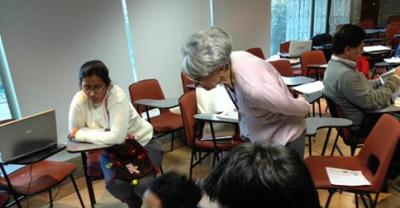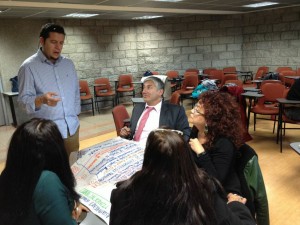Mason Professors, Graduates Take Active Role in Latin American Conflicts
M.S., Conflict Analysis and Resolution, George Mason University
B.A., Political Science, Philosophy, Regis University, Denver Colorado
Ph.D., Conflict Analysis and Resolution 2007, George Mason University
M.S., Conflict Analysis and Resolution 2002, George Mason University
 |
 Faculty members of George Mason University’s School for Conflict Analysis and Resolution were joined by graduates of the school, some now teaching in South America, for a weeklong conflict assessment and resolution workshop in Bogotá, Colombia in June.
Faculty members of George Mason University’s School for Conflict Analysis and Resolution were joined by graduates of the school, some now teaching in South America, for a weeklong conflict assessment and resolution workshop in Bogotá, Colombia in June.
It was the 10th year that George Mason representatives participated in the “Summer Workshop on Conflict Resolution in Latin America and the Caribbean,” held this year in partnership with the Pontificia Universidad Javeriana in Bogotá and sponsored in part by the Organization of American States.
Participants from 10 Latin American countries attended the sessions, presenting conflict cases from their home communities in the hopes of learning how to resolve them. The focus this year was on the management or exploitation of natural resources—environmental conflicts that often involve the rights of indigenous peoples, adding cultural and ethnic variables to the conflicts.
Case studies were presented by those in a range of professions and a variety of backgrounds, says Lisa Elaine Shaw, director of the School for Conflict Analysis and Resolution’s Student Services and Field Experience Program.
 Attendees came from government ministries, nongovernmental organizations, universities and industries such as fishing and mining, each hoping to learn skills they can take back to their organizations to help them more thoroughly assess programs and include all stakeholders. “They also learned to engage with all parties more effectively and how to think about conflict a little bit differently,” says Shaw.
Attendees came from government ministries, nongovernmental organizations, universities and industries such as fishing and mining, each hoping to learn skills they can take back to their organizations to help them more thoroughly assess programs and include all stakeholders. “They also learned to engage with all parties more effectively and how to think about conflict a little bit differently,” says Shaw.
For example, one participant’s case involved mining rights in Mexico. “The questions are who owns the land? What are the environmental impacts of the mining? There are conflicts between the perceived owners of the land and the indigenous people,” says Shaw, who was attending her second workshop. The instructors attempted to show the participant, says Shaw, “how to deal with a conflict that has multiple stakeholders and understand each of the groups’ viewpoints. What are the possible solutions and how do you negotiate?”
“For Mason, participation in the workshops each year shows we are engaging in issues in that part of the world,” says Mason professor Patrician Maulden. “We have alumni who are actively working with environmental conflicts across South America. Our continued involvement with the project, aside from supporting these alumni in their work, is also an investment in goodwill.”
This material is presented as the original analysis of analysts at S-CAR and is distributed without profit and for educational purposes. Attribution to the copyright holder is provided whenever available as is a link to the original source. Reproduction of copyrighted material is subject to the requirements of the copyright owner. Visit the original source of this material to determine restrictions before reproducing it. To request the alteration or removal of this material please email [email protected].
rosters
IMPORTANT LINKS
- Home
- Admissions
- Academics
- Research & Practice
- Center for Peacemaking Practice
- Center for the Study of Gender and Conflict
- Center for the Study of Narrative and Conflict Resolution
- Center for World Religions, Diplomacy, and Conflict Resolution
- Indonesia - U.S. Youth Leadership Program
- Dialogue and Difference
- Insight Conflict Resolution Program
- Parents of the Field Project
- Program on History, Memory, and Conflict
- Project on Contentious Politics
- Sudan Task Group
- Undergraduate Experiential Learning Project
- Zones of Peace Survey
- News & Events
- Student and Career Services
- Alumni
- Giving






